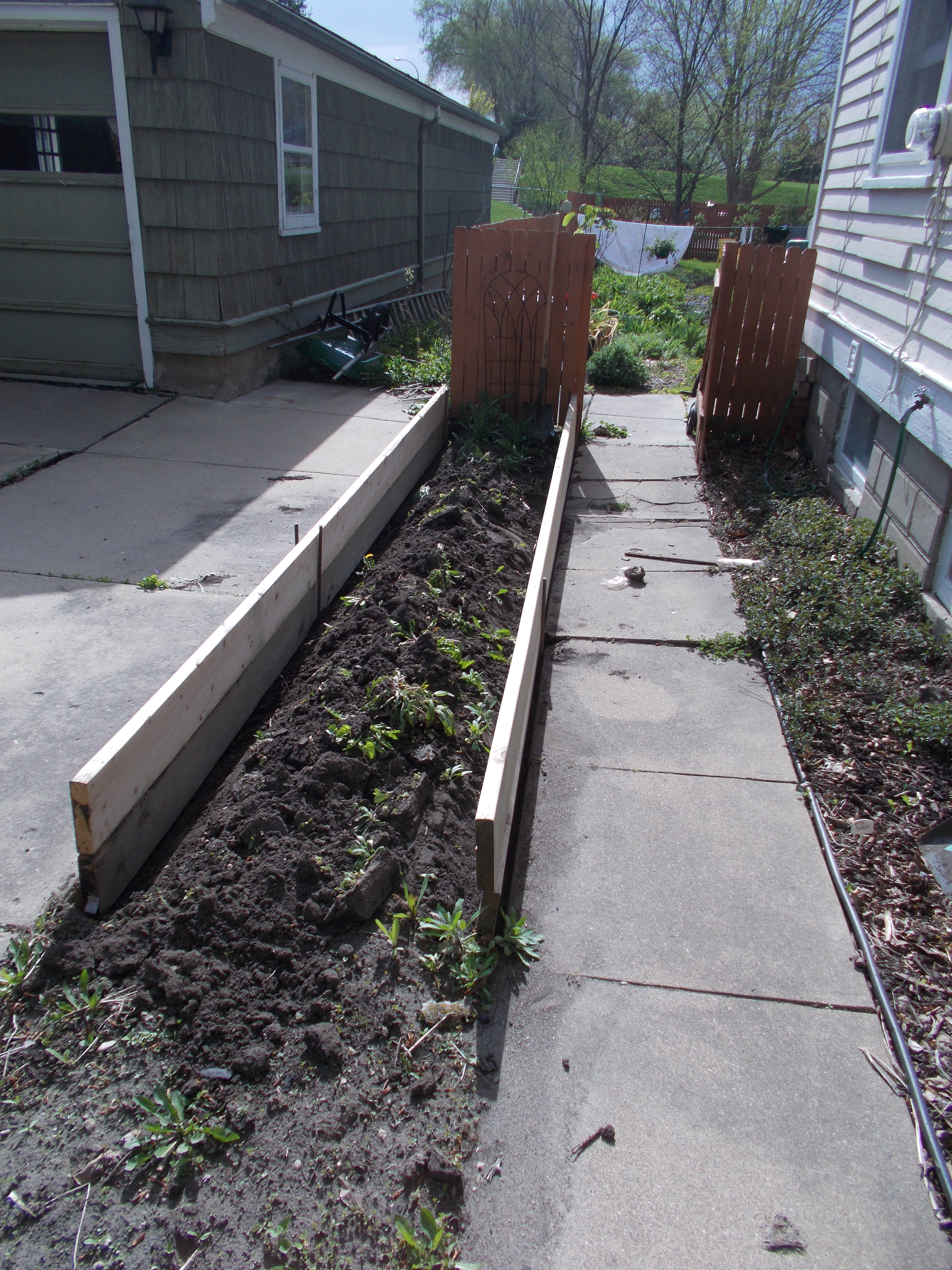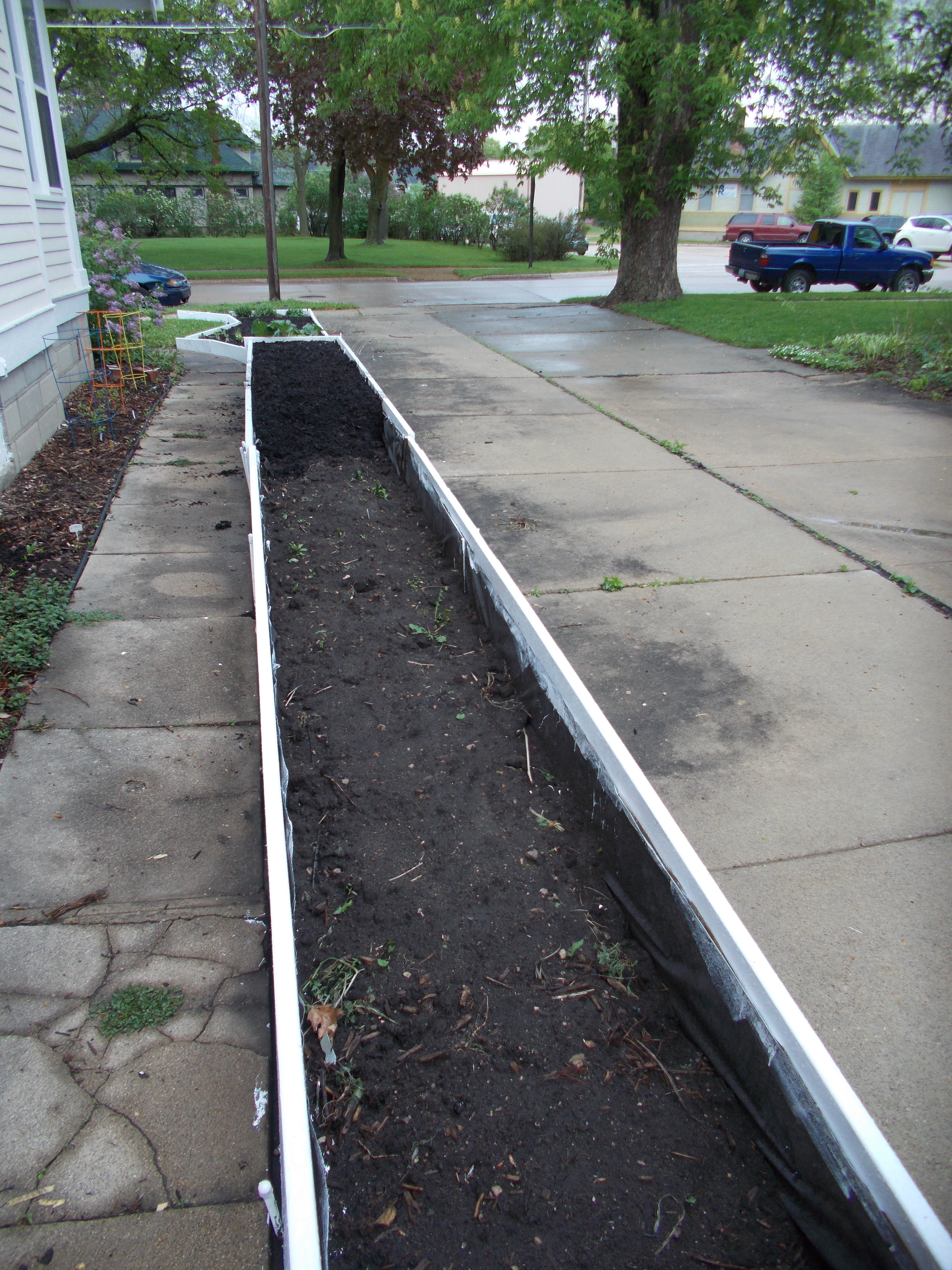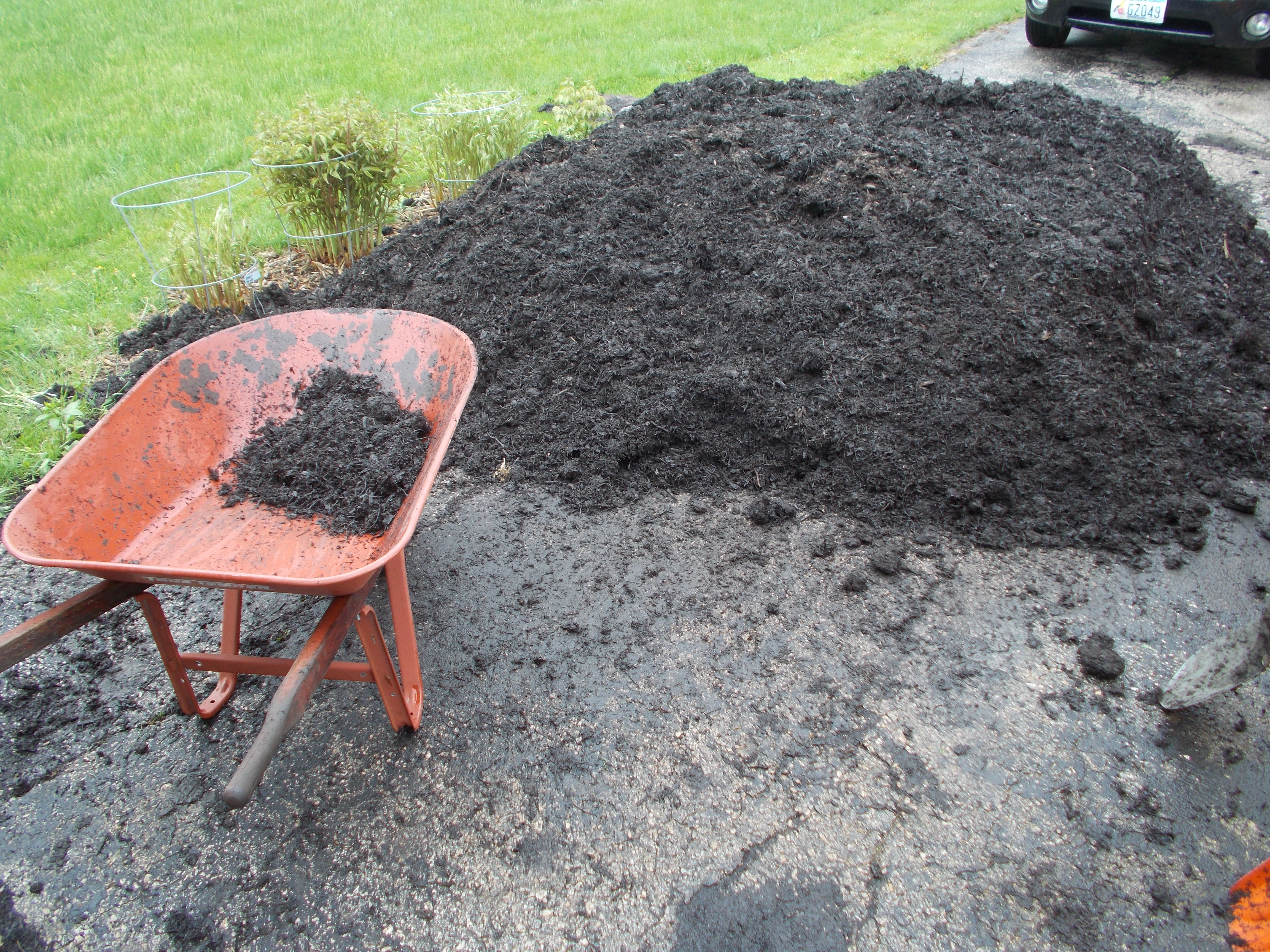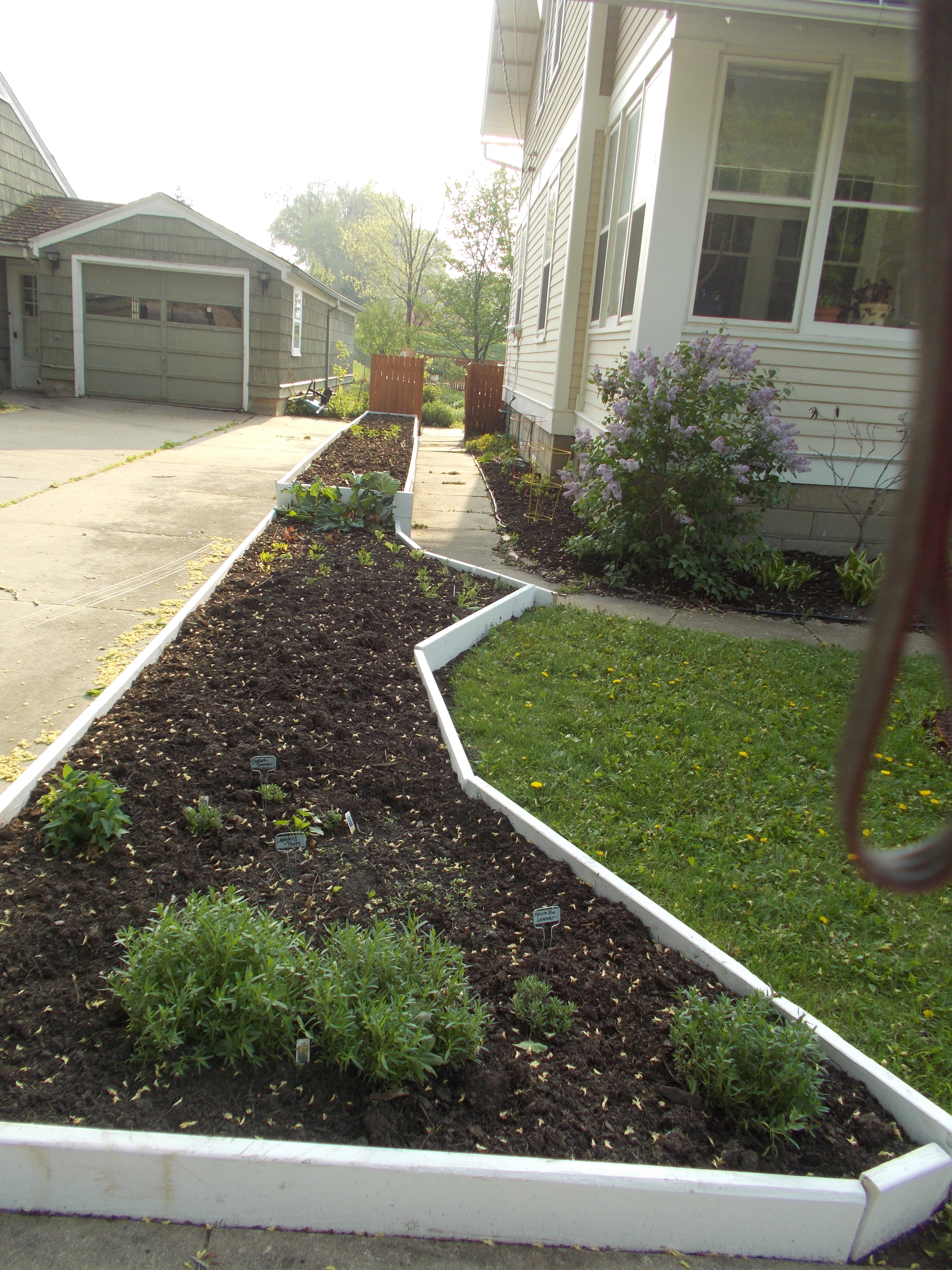
I spent the middle of May — just after classes ended, even before turning in my grades — in a fever of garden work, reclaiming a quackgrass-infested lily bed and moving and spreading a giant pile of mulch and constructing a long-dreamed-of raised bed by hand. All of this I did by myself, in one week. Technically, I had a reason and a deadline — sixty-five graduating seniors, family members, and colleagues were coming to my house for a post-baccalaureate reception — but as always the work became its own obsession and reason for being. In what’s been another strange, cool spring, I couldn’t wait to take advantage of sudden sun and warmth to get the boards up and fastened together and filled to take advantage of this south-facing growing spot, which gave me a great crop of okra last year despite the way water tended to leak down over the sidewalk. But I had to wait for a little while — first on the eco-friendly wood preservative I ordered (linseed oil is fine for that purpose if you can find it at your hardware store, but boiled linseed oil, which is what most hardware stores carry, is not, since it contains cadmium), then for that preservative to dry once I’d applied it. Nevertheless, soon construction could begin: I laid out a series of untreated fir boards and tucked them in along the edges of my sidewalk and my neighbor’s driveway, then drove in two-foot lengths of rebar inside and out for reinforcement, staple-gunned landscape cloth to the inside (luckily a colleague lent me his electric staple gun), and painted the whole thing white (with low-VOC paint, of course) to match the trim of my house and make it all look coherent from the street.
 And then, of course, it was time to fill the bed – in this case, with mulch brought to me by my kind friend from our urban-gardening club. Thirty wheelbarrow loads — all loaded, trundled, and dumped by hand, back and forth across the yard. What was left went onto vegetable beds in the back.
And then, of course, it was time to fill the bed – in this case, with mulch brought to me by my kind friend from our urban-gardening club. Thirty wheelbarrow loads — all loaded, trundled, and dumped by hand, back and forth across the yard. What was left went onto vegetable beds in the back.

 All the work began on Tuesday. As of Friday afternoon, the raised beds were built, painted, filled, and planted. Saturday morning I heaved a giant, slimy load of too-long-neglected yard waste hidden on the other side of the garage, forkful by forkful, into a college truck (luckily, I had some help unloading.) Then I baked and cleaned and got the house ready. The party was great. The food was plentiful. The students and their families were lovely. And the yard was perfect.
All the work began on Tuesday. As of Friday afternoon, the raised beds were built, painted, filled, and planted. Saturday morning I heaved a giant, slimy load of too-long-neglected yard waste hidden on the other side of the garage, forkful by forkful, into a college truck (luckily, I had some help unloading.) Then I baked and cleaned and got the house ready. The party was great. The food was plentiful. The students and their families were lovely. And the yard was perfect.
But the next morning — and for much of the week following it — I could barely use my hands. A deep ache ran down my arms into my elbows. The numbness in my swollen wrists and fingers woke me up every morning. I typed my final comments on students’ stories because it was marginally less painful than holding a pen. I chopped my beautiful co-op apricots for some very careful preserves; if I let them sit any longer, they’d go bad, but I wished I could have waited just another day or two before I had to stir. Pulling a weed, or grabbing a shovel — forget about it. My back and knees hurt too. Every gesture was slower, considered: how can I do this so it won’t hurt?
Perhaps foolishly, I was aghast. I’m 38, not 68. I’d never been afraid of hard work or unable to bounce back after it. But this — this was different. The ache felt deeper, more permanent, more jeering and chastening: you think you can do all this on your own, in five days? Think again! In my state of pain and (temporary, unaccustomed) disability, I couldn’t stop remembering Virginia Woolf’s lines about the differences between illness and health, which can feel like two totally different countries. “Considering how common illness is,” she wrote in 1926, “how tremendous the spiritual change that it brings, how astonishing, when the lights of health go down, the undiscovered countries that are then disclosed, what wastes and deserts of the soul a slight attack of influenza brings to light…it becomes strange indeed that illness has not taken its place with love, battle, and jealousy among the prime themes of literature.”
It’s true. If you are blessed enough not to experience it often, a state of illness, inability, disability (how all those words circle around ability, and how you don’t realize until it’s threatened how much your concept of your ability and capability to do and make and work has shaped your whole identity) really throws you. And it reminds you, as hard as you have been working to forget it: you are probably not going to be so able and capable forever. In my little house during that week of post-gardening pain, I looked at faucets and doorknobs with eyes shaped by a different state. I looked at my beloved old clawfoot bathtub. I looked at my stairs. Something in my mind edged unwillingly sideways, making room for future realities and possibilities I usually consider as little as I possibly can.
“Resolve to be tender with the young, compassionate with the aged, sympathetic with the striving and tolerant with the weak and wrong,” the Buddha says. “Sometime in your life, you will have been all of these.” A single woman, I am used to working like hell, physically and intellectually, to secure my own life, accustomed to the idea that without children or spouse I’m going to have to take steps to avoid becoming a burden. Yet without pain, I realized, I also too easily slide into being without compassion. How fluent we (relatively) young and “ablebodied” are in our impatience with those whose ligaments are stiffer, whose fingers are swollen, who are dealing with years’ more worth of frustration at not being able to do things they once took for granted than we are experiencing in our week of post-gardening pain. That rage and humiliation and impatience, with oneself and with the whole progress of time and change, that I felt this week — some people feel that every day. And like Lear contemplating his fellow wanderers, I feel stricken: I have taken too little care of this.
When I admit something like this to myself, the universe tends to send me little confirmation signs: this week, as I’m getting the feeling back in my hands, I got a call from an 84-year-old lady who’ll be my “gardening mentoree” through our urban-gardening group. “The spirit is willing,” she says wryly, “but the back is weak.” I can’t wait to meet her and talk with her about her garden.
Significantly, as the pain starts to fade, a new kind of awareness is fading in. It’s helped by finishing up a piece on the great English editor and writer Diana Athill for Bloom (a site founded by my friend Sonya Chung, celebrating writers whose careers began after 40), which has sent me back to her memoirs on aging and a very full life and has made me ponder the growth of the soul over time, all over again. Diana Athill is now 95, still thoughtful and coherent, still writing. For years, she gardened too. And now, on the balcony of her retirement-home room, she still keeps morning glories and begonias (with some amusement, since her English-gentry mother always considered them blowsy and vulgar.) What she says in her memoir Somewhere Towards the End (2008) about the joyous presence of young people in her life is true, I think, of gardening too:
What is so good about it is not just the affection young people inspire and how interesting their lives are to watch. They also, just by being there, provide a useful counteraction to a disagreeable element in an old person’s life. We tend to become convinced that everything is getting worse simply because within our own boundaries things are doing so. We are becoming less able to do things we would like to do, can hear less, see less, eat less, hurt more, our friends die, we know that we ourselves will soon be dead…It’s not surprising, perhaps, that we easily slide into a general pessimism about life, but it is very boring and it makes dreary last years even drearier. Whereas if, flitting in and out of our awareness, there are people who are beginning, to whom the years ahead are long and full of who knows what, it is a reminder – indeed it enables us actually to feel again – that we are not just dots at the end of thin black lines projecting into nothingness, but are parts of the broad, many-coloured river teeming with beginnings, ripenings, decayings, new beginnings – are still parts of it, and our dying will be part of it just as these children’s being young is, so while we still have the equipment to see this, let us not waste our time grizzling.
Seeing ourselves as part of some greater cycle — the spiritual starting point for gardeners, as for the rest of us. Child, adult, elder. At some point in your life, you will be all of these.